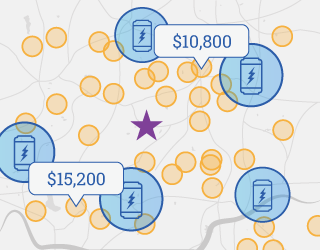As is the case with comparing solar panels and inverters, when comparing solar batteries, there are a number of different technical specifications that differentiate one battery from another: power ratings, usable energy capacity, warranties throughput or cycles, start-up power, and the efficiency of the battery. Unlike solar panels and inverters, though, the stated efficiency of each battery is not necessarily directly comparable to the efficiency of other batteries. Here’s why:
Quick refresher: how do batteries store electricity
Energy storage refers to a range of technologies that take electricity produced at one point in time and put it aside for use at a later point in time. The technology used today ranges from mechanical (like flywheels) to gravitational (like pumped hydro) to chemical, like what’s used most frequently in solar batteries for home use. In fact, solar batteries most frequently rely on lithium ion chemistry, which, at a very, very high level, is a way of describing the conductive separator through which ions flow from an anode to a cathode and back again.
Still with me? Don’t worry, no more chemistry after that.
Importantly, all batteries store direct current (DC) electricity, from your phone, to your laptop to solar batteries like the Tesla Powerwall 2 or LG Chem RESU 10H. However, the electricity that you use in your home is alternating current (AC) electricity, which means that stored electricity must pass through an inverter between your battery and the outlets on your wall. Check out our Electricity 101 article and infographic to dig deeper into the differences between AC and DC energy.
What does energy storage efficiency measure?
Efficiency is a simple metric for both solar panels and solar inverters: how well does a solar panel convert the solar energy that hits it into electricity, and how well does the inverter transform that output from DC to AC electricity. For batteries, it’s a bit more complex.
Most solar batteries are rated on their roundtrip efficiency, which means for every unit of energy that you put into the battery, how many units of energy will you be able to take back out. For instance, if you put 10 kilowatt-hours (kWh) into a battery, and are able to take 9 kWh back out again, that means the battery has a roundtrip efficiency of 90 percent. And don’t worry, losses are completely normal and expected when storing energy – it’s one of Newton’s laws.
From here, talking about the efficiency of energy storage and, specifically, of energy storage systems gets a bit murkier and more complex.
When paired with solar panel systems, batteries are either AC coupled or DC coupled. The difference is: is the electricity from your solar panels inverted before being stored in your battery?
Efficiency for DC coupled batteries
When you install a DC coupled solar + storage system, electricity from your solar panels heads directly into your battery. When you want to access that stored electricity, it passes through an inverter on its way out of your battery and into your home or business to become usable AC electricity. As such, there is only one inversion process: when you take the electricity out of the battery. This is an important distinction, because electricity losses occur any time you invert electricity from AC to DC and back again. (Remember: inverters have an efficiency rating too.)
Efficiency for AC coupled batteries
When you install an AC coupled solar + storage system, DC electricity from your solar panels passes first through an inverter (1 inversion) to become AC electricity, then passes through a storage inverter (2 inversions) to be stored in the battery as DC electricity, before finally passing through an inverter one more (3 inversions) time when you want to pull the electricity out of the battery and use it as AC electricity in your home or business.
Because there are three inversions, there are losses at every step, meaning that the roundtrip efficiency of an AC coupled energy storage system will be lower than that of a DC coupled system.
One more thing to think about: does your battery have its own inverter?
I promise this is the last bit of complexity with comparing the efficiencies of batteries. When looking at the specs of different batteries, you’ll need to know if your battery comes with a built in inverter. Thankfully, we’ve written a handy article about which batteries have their own inverter.
In a nutshell, whether or not your battery comes with a built in inverter impacts what the efficiency on its spec sheet measures. The best metric to compare in this scenario is the efficiency all the way from the electricity produced by your solar panels to the AC electricity that you ultimately pull from the battery to use.
Get quotes for energy storage on EnergySage
If you’re interested in learning more about energy storage, check out our other articles comparing batteries, different chemistry types, and much more. On EnergySage, you can get custom quotes for solar plus storage installations for your home or business. Sign up for a free account today to get started!






